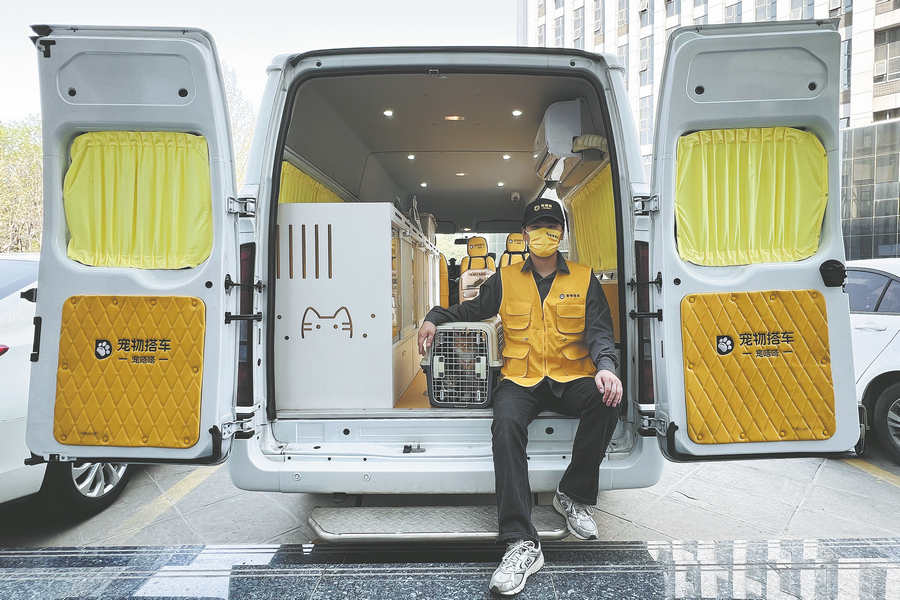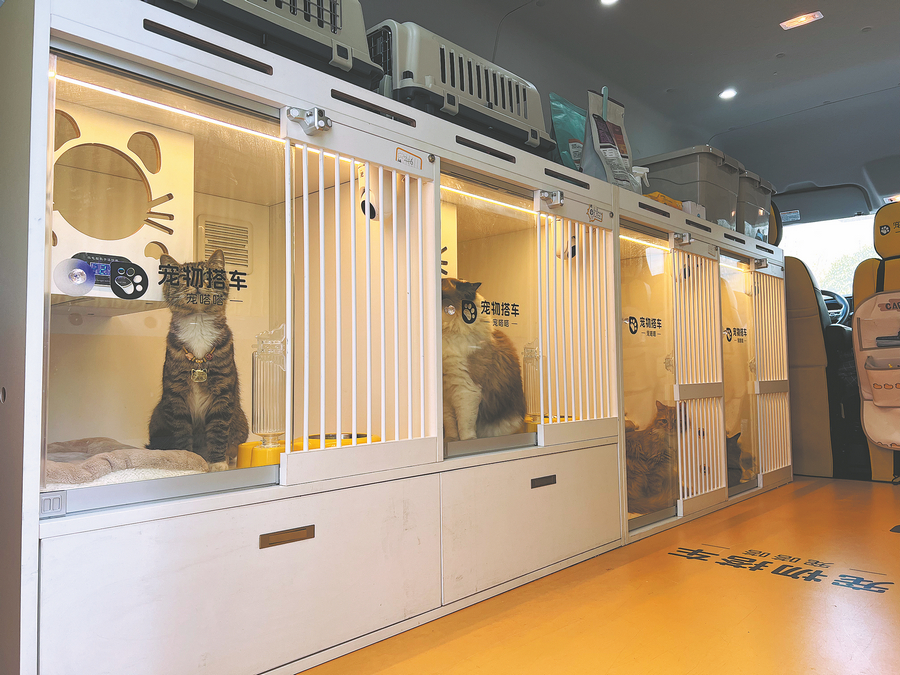Cats out of the bag: paws, claws, business-class seats
Once treated as cargo, pets now travel with dignity thanks to a pair of animal lovers


When Tu Fan relocated with her 12 cats from Beijing to Hangzhou, Zhejiang province, she rented an expensive truck, assuming the animals would travel comfortably. After more than 10 hours on the road, however, the outcome was grim.
"The cats were almost all frightened, covered in urine and feces," Tu said. "The smell was overwhelming, and most of my belongings had to be thrown away." The ordeal convinced her that there had to be a better way.
A Peking University graduate, Tu had previously pursued education and live-streaming ventures, but she eventually recognized the unmet needs of pet owners like herself. In a stroke of fortune, she met her future business partner, Wang Jingjing, in 2023.
Wang had already created a simple online program for pet transport requests. "It was like a very simple version of the ride-hailing platform Didi," Tu said. The program had quickly gone viral, stressing servers.
The success came with unexpected problems. Orders drew complaints as third-party transporters treated pets like cargo, and in some cases, animals went missing.
By the time Tu joined, Wang had already converted a vehicle for pets and secured official registration. Tu saw the potential but also the gap: most pet owners lacked access to such services. Drawing on her livestreaming and marketing experience, she began building an online presence through blogs, short videos, and customer outreach.
The pair named their new venture Chongdada, and from there, the company grew rapidly.
They expanded their fleet and technology, fitted each crate with temperature and humidity controls, and added monitoring cameras. They even developed a behavior recognition model that detects whether an animal is resting, eating, or showing signs of stress.
"The model notifies us, for example, if a cat has defecated," Tu said. "Our staff can handle it immediately."
Such upgrades arrived just as demand was booming. According to Zhiyan Consulting, China's pet transportation market grew from roughly 22 billion yuan ($3.1 billion) in 2020 to about 32 billion yuan in 2024, a compound annual growth rate close to 10 percent.
Yet the industry has long faced complaints about opaque operations, weak monitoring, and inconsistent safety. Chongdada sought to counter those fears with transparent data, standardized processes, and attentive care.
Pricing depends on factors such as species, size, cage dimensions, distance, city tiers, and service levels. Premium rides average about 1,300 yuan, with spaces resembling business-class seats. Each trip is stocked with new supplies such as litter boxes, bedding, and bowls.
Much of the work falls to pet stewards. On board, they feed animals, clean up, walk dogs when needed, and relay updates to owners through online chat groups. The service adapts to each animal, from cats and dogs to rabbits and reptiles.

With more than 200 modified vehicles and 31 company-operated stations serving 42 routes nationwide, Chongdada has grown into one of the leading players, reaching nearly all provinces and autonomous regions.
For pet owners, that growth translates into peace of mind.
Customer Chen Kexin booked a premium cabin, paying more than 700 yuan to transport her timid cat from Ningbo, Zhejiang province, to Shenzhen, Guangdong province.
"My cat usually refuses food and water on the road, but this time she arrived calm and immediately ate," Chen said.
"We've grown fast because we are addressing a real need," Tu said.
Chen's experience reflects a wider shift: pet travel options are multiplying. Ride-hailing platforms such as Didi and Hello now offer pet-friendly express cars and delivery services in most major cities, giving owners more options for routine trips to veterinarians or grooming salons.
As options multiply, experts warn that pet mobility must be balanced with public interests.
"Pet travel services meet the needs of some owners, but they also have to consider other groups," said Xu Guangjian, a professor at the School of Public Administration and Policy of Renmin University of China in Beijing, in a report by Xinhua News Agency. "Public spaces have different characteristics, and if proper pet facilities aren't in place to separate people and animals effectively, opening them to pets is not advisable."
The industry momentum has also caught the attention of policymakers. In August, the Ministry of Agriculture and Rural Affairs issued new guidelines for designated animal-transport checkpoints to curb illegal shipments, prevent disease, and build traceability systems.
In June, the rail authorities widened a high-speed rail pilot to 25 stations and 38 services on eight mainlines, allowing passengers to consign one small healthy cat or dog on their train, according to Xinhua.
Chinese airlines also began offering "pets in cabin" service. China Eastern Airlines launched a program in Taiyuan, Shanxi province and has since expanded it to more routes.




































